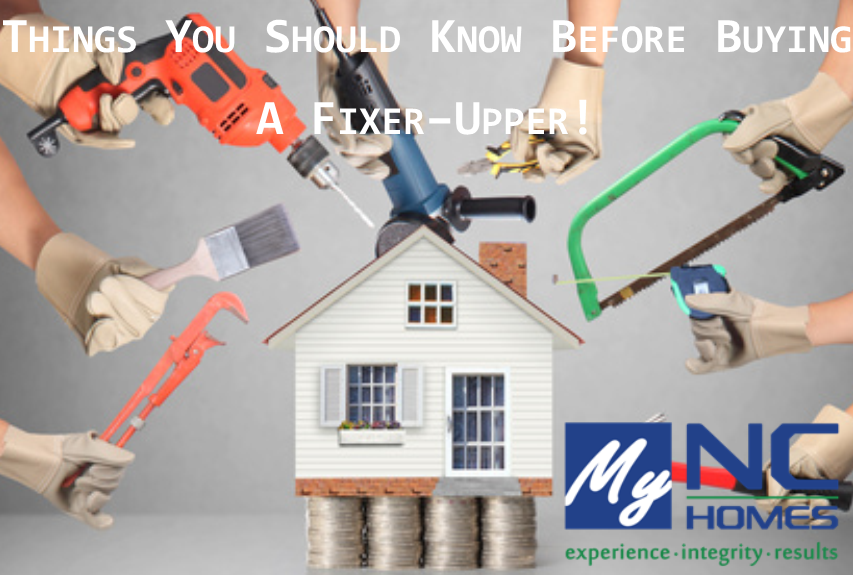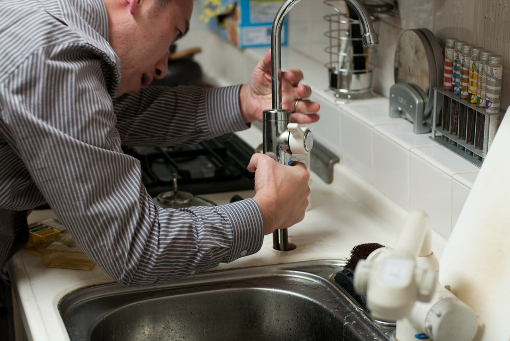
Things You Should Know Before Buying A Fixer Upper
With the boom of home improvement shows and the growth of entire neighborhoods being renovated it seems like taking on a big project is becoming the norm. So, if you're in the market for a new home, a fixer-upper can be very appealing. A fixer-upper is a home that needs to be renovated and because of this is often priced lower than other homes in the area. The price and freedom to completely customize your home draws in thousands of people every year. This doesn't mean that these homes don't come with their fair share of issues, and potential owners should know the risks. Both Larry Tollen and Andrew Palumbo who lead the My NC Homes Team have extensive experience working on homes. Here are the most important things that they feel everyone considering a fixer should know before buying.
1. Do as much research as possible.
When considering a renovation, it is important to do your research. This is a good time to investigate the time and money commitments that you are about to take on. Look into other people's real-life experiences with renovations and realize that what happens on television is not likely to happen to you. This also a good time to get to know your style. Find out what you like and dislike in a home and where you would like to buy. As we all know, a little research goes a long way. 
2. Get to know your contractor.
One of the most important steps to take when buying a fixer is to get the proper help. Doing your research to find a contractor and team is pivotal to the progress of your project. Ask your friends and family or community members who have done projects who they've used. There are a number of apps and websites that provide the basic rates, reviews, and contact information for contractors in your area. You can also ask us, we're happy to share our personal favorites with you. While you may not think about the chemistry between you and your contractor as important, trust us it is. Take the time to really know that you and your contractor are compatible with one another and communicate well. Taking time to vet your contractor will undoubtedly make your renovation go more smoothly.
3. Sometimes you can do the work yourself.
Unless you're a professional or just handy; chances are you won't be doing the bulk of the work on your own. This doesn't mean that there aren't any projects that you can't do on your own. Think small when doing projects because you will regret taking on more than you can handle during this stressful time. Projects such as peel and stick floors, painting or gardening are simple and cost-effective tasks. Once again unless you've got the experience don't go too big with your DIY project keep it simple and safe.
4. Location: Is this a good place to put thousands into building up a home?
Before deciding to take on a renovation look into location. You need to know whether this location will continue to grow and develop. Know whether this location will help you build equity in your home or is likely to go down in value soon. You also should investigate the value of the homes around you. It doesn't make sense to put buy a home for $100k and put $100k into the home if the homes in the area are currently average $150,000 - $175,000. Things you need to consider include the schools in the area, the surrounding neighborhoods, walkability, and see how far you are from the places and people you visit frequently.
5. Is your budget really adequate?

Before making a final decision about whether to purchase the home, you will want to take a close look at your budget. Know what you can and cannot afford to do. Know how much you are willing to invest into a home. Plan for the unexpected and budget for the unknown. A good rule of thumb is to add an additional 10-15% onto your budget for these unexpected expenses. Think carefully about the use of credit cards and how you will pay for these things after you finish your renovation. You may even have to budget for new furniture. Your new home may be different in size or you may just realize that things don't look the way you planned. At the end of the day it always comes down to money and fixers by definition, take more.
6. Where will you live if you decide to take on a fixer?
Since renovating and remodeling a fixer upper can often take months, think about where you will live while the renovations are happening. Are able or willing to stay with family? Will you be able to stay in your the home while renovations are going on or will you need to stay somewhere else? Consider the cost of finding a new place to stay until your renovation is done. If you have children, consider if they will have to change schools or if their commute will be impacted. You need to think of all these things so that you and your family are ready if you decide to move forward
6. Some fixers are money pits!
Anytime you're considering purchasing a fixer upper, you need to be aware that some fixer uppers are just money pits. Some homes have so many hidden issues that you won't discover until you have purchased the home and work has begun. In these cases, you will need to keep putting money into fixing up the home and will often invest more into the home than you'll get back later in the home's value. It’s critical to have the home inspected by a qualified professional as part of your offer. If you discover there’s more involved than you were expecting it may be time to cut your losses and walk away.
7. Are you complying with state/local regulations?
When you're talking with contractors about what will need to be done for the home, be sure that they won't be taking any short cuts and confirm upfront that they will be applying for all necessary permits. You want to make sure that they are adhering to all state and local regulations and all building codes. If you try to save a few bucks by doing things in a way not approved by the state, not only could it make your home unsafe, but it could come back to bite you when you try to resell your home in the future. Also consider if this area has a homeowner’s association that regulates what can and cannot be changed in and around you home.
8. Fixer Uppers aren't for everyone.
It takes a certain kind of resilience to be able to handle all the stress, organization, and work that is necessary to renovate a home. Before you decide to purchase a fixer upper, really think about whether this is something you are ready to handle. Think about the time, money and possibly sanity that you are about to give up. If you are ready and sure, then take that leap and go for it. But, remember, there are no Chip and Joanna Gaines or Property Brothers ready to come to your rescue.
Victoria Johnson is a contributing writer and media specialist for Allied Van Lines She often produces content for a variety of home and real estate blogs.
Posted by Larry Tollen on
Leave A Comment